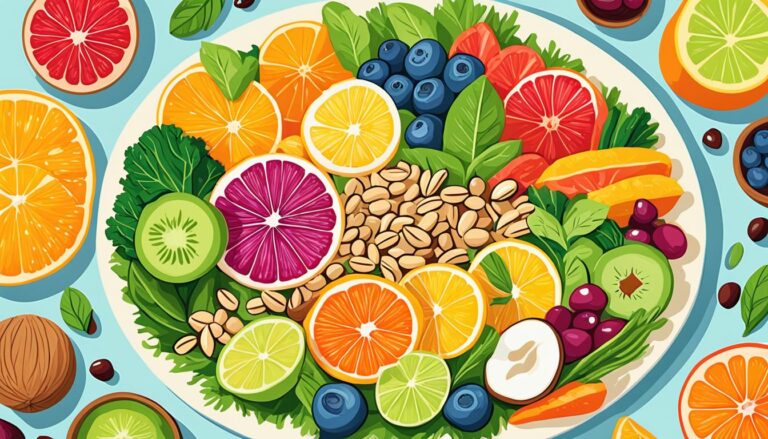Probiotics have gained popularity for their potential benefits in improving gut health. Recent explorations of the human gut microbiota suggest that these live microorganisms can help restore the composition of the gut microbiome, leading to improvements in gut inflammation and other intestinal or systemic disease phenotypes. By introducing beneficial bacteria to the gut, probiotics can promote a balanced and healthy gut microbiome. This review focuses on the role of probiotics in shaping the structure and function of the intestinal microbial communities, highlighting their potential to enhance digestion and overall well-being.
Probiotics and Gut Health Key Takeaways:
- Probiotics can improve gut health by restoring the composition of the gut microbiome.
- Introducing beneficial bacteria through probiotics can promote a balanced and healthy gut microbiome.
- Probiotics have the potential to enhance digestion and overall well-being.
- They can help reduce gut inflammation and improve intestinal or systemic disease phenotypes.
- Incorporating probiotics into your daily routine can support a healthy gut microbiome.
Understanding the Gut Microbiota and its Effects on Health
The human gut is a complex ecosystem that houses trillions of microorganisms, collectively known as the gut microbiota. These microorganisms, including bacteria, viruses, fungi, and other microbes, play a fundamental role in various physiological functions, such as nutrient absorption and immune system regulation.
A healthy gut microbiome is characterized by a diverse and balanced community of microorganisms. It fosters a harmonious relationship between the host and the microbiota, resulting in optimized digestion and overall well-being. Conversely, imbalances in the gut microbiota, known as dysbiosis, have been linked to numerous health issues, including digestive disorders, immune dysfunction, and mental health disorders.
One key area where the gut microbiota’s impact is particularly pronounced is digestion. The gut microbiota helps break down complex food components, synthesizes essential nutrients, and produces short-chain fatty acids (SCFAs), which are crucial for intestinal health. When the gut microbiota is imbalanced, these processes can be disrupted, leading to digestive discomfort, nutrient malabsorption, and inflammation.
The Importance of a Healthy Gut Microbiome
A healthy gut microbiome not only aids in digestion but also influences overall health and well-being. Here are some key reasons why maintaining a healthy gut microbiome is crucial:
- Promoting a strong immune system: The gut microbiota plays a vital role in training and regulating the immune system. It helps distinguish between harmful pathogens and beneficial microorganisms, enabling the immune system to respond appropriately.
- Enhancing nutrient absorption: Beneficial gut bacteria aid in the digestion and absorption of nutrients, such as vitamins, minerals, and fatty acids. They also produce enzymes that break down complex carbohydrates, making them more readily available for absorption.
- Supporting mental health: The gut-brain axis, a bidirectional communication system between the gut and the brain, is influenced by the gut microbiota. Emerging research suggests that alterations in the gut microbiota composition may contribute to mental health disorders, such as anxiety and depression.
“A healthy gut microbiome is essential for overall well-being, as it affects digestion, immune function, and even mental health.”
Given the significance of the gut microbiota in maintaining optimal health, it is essential to nourish and support its diversity. One way to achieve this is through the use of probiotics.
The Role of Probiotics in Supporting Digestion
Probiotics are live microorganisms that, when consumed in sufficient quantities, confer health benefits to the host. These beneficial bacteria can help restore balance within the gut microbiota, improving digestion and overall gut health. Probiotics can be found in various food sources, such as yogurt, kefir, sauerkraut, and kimchi, or taken as supplements.
By incorporating probiotics into your diet, you introduce beneficial bacteria that can populate the gut and contribute to a balanced and diverse gut microbiome. Probiotics can help enhance digestion by:
- Promoting the breakdown of complex carbohydrates, proteins, and fats.
- Inhibiting the growth of harmful bacteria that can lead to digestive issues.
- Reducing inflammation in the gut, helping to alleviate symptoms of inflammatory bowel diseases like Crohn’s disease and ulcerative colitis.
When choosing probiotics for digestion, it is essential to select strains that have been shown to have beneficial effects on gut health. Look for well-researched strains, such as Lactobacillus acidophilus, Bifidobacterium bifidum, and Saccharomyces boulardii, which have been extensively studied for their digestive benefits.
Remember, a healthy gut microbiome is key to maintaining overall well-being. By understanding the importance of the gut microbiota and incorporating probiotics into your diet, you can support optimal digestive health and promote a balanced gut microbiome.
| Benefits of a Healthy Gut Microbiome | Role of Probiotics in Digestion |
|---|---|
| Promotes a strong immune system | Promotes breakdown of complex carbohydrates, proteins, and fats |
| Enhances nutrient absorption | Inhibits growth of harmful bacteria |
| Supports mental health | Reduces inflammation in the gut |
The Role of Diet in Shaping the Gut Microbiota
Diet plays a significant role in shaping the composition and function of the gut microbiota. By choosing the right foods, you can promote the growth of beneficial bacteria in your gut, leading to a healthier microbiome. Incorporating gut-friendly foods into your diet can have numerous benefits for your gut health and overall well-being.
Foods Rich in Fiber: Nourishment for Beneficial Bacteria
One key group of foods that can support a healthy gut microbiota are those rich in fiber. Fruits, vegetables, and whole grains are excellent sources of dietary fiber. When consumed, these foods act as prebiotics, providing nourishment for the beneficial bacteria in your gut. Prebiotics serve as fuel for these bacteria, helping them thrive and maintain a balanced microbiome.
Including a variety of fruits and vegetables in your diet can provide different types of fiber that support the growth of diverse bacterial species in your gut. Opt for foods like berries, leafy greens, broccoli, and beans to incorporate these gut-friendly nutrients into your meals.
Fermented Foods: Natural Probiotics for a Balanced Gut
Another way to support a healthy gut is by including fermented foods in your diet. Fermentation is a process that creates natural probiotics, which are live microorganisms that can contribute to a diverse and balanced gut microbiota. These foods undergo a fermentation process that produces beneficial bacteria, such as lactobacillus and bifidobacterium.
Popular fermented foods include yogurt, kefir, sauerkraut, kimchi, and kombucha. Adding these foods to your diet can introduce beneficial bacteria into your gut and promote a more balanced microbiome. Look for products that contain live and active cultures to reap the most benefits.
Remember to consume these fermented foods in moderation, as excessive intake may cause digestive discomfort for some individuals.
The Benefits of a Well-Functioning Microbiome
A healthy gut microbiota can bring a range of benefits to your overall health. A well-functioning microbiome supports efficient digestion and nutrient absorption, contributing to better overall gut health. Additionally, a balanced gut microbiota plays a crucial role in supporting a strong immune system, as it helps regulate immune responses and protects against harmful pathogens.
Research has also suggested that a healthy gut microbiome may have positive effects on mental health, weight management, and inflammatory conditions, although more studies are needed to fully understand these connections.
By incorporating gut-friendly foods into your diet, you can support a healthy gut and experience the benefits of a well-functioning microbiome. The table below highlights some examples of fiber-rich and fermented foods to consider adding to your meals.
| Fiber-Rich Foods | Fermented Foods |
|---|---|
| Broccoli | Yogurt |
| Berries | Kefir |
| Leafy Greens | Sauerkraut |
| Whole Grains | Kimchi |

By nourishing your gut with these foods, you can support a healthy gut microbiota and enjoy the benefits of a well-functioning digestive system. Take care of your gut, and it will take care of you!
Probiotics and Specific Health Conditions
While probiotics are widely known for their benefits in improving gut health, they have also been studied for their potential effects on specific health conditions. Research suggests that incorporating probiotics into your daily routine can have positive impacts on your immune system and weight management.
Probiotics can strengthen the immune system, helping to reduce the risk of infections and enhance overall immune function. These beneficial bacteria work in harmony with your body’s natural defense mechanisms, promoting a healthy balance in your gut microbiota, which plays a crucial role in supporting your immune system’s effectiveness.
Moreover, certain strains of probiotics have shown promise in aiding weight management. Probiotics can influence metabolism and digestion, potentially leading to weight loss and improved body composition. Additionally, they may help reduce inflammation, which is often associated with weight gain and related health issues.
Incorporating probiotics into your daily routine is just one piece of the puzzle. To achieve optimal results, it is essential to complement probiotic consumption with a balanced diet and regular exercise. When focusing on gut health, it’s equally important to include gut-friendly foods that nourish your gut microbiota.
The Power of Gut-Friendly Foods
Gut-friendly foods are those that promote the growth and diversity of beneficial bacteria in your gut. By incorporating these foods into your diet, you are creating an environment that supports a healthy gut microbiota.
Here are some examples of gut-friendly foods:
- Fiber-rich fruits and vegetables
- Whole grains
- Fermented foods like yogurt, kefir, and sauerkraut
These foods act as prebiotics, providing nourishment for the beneficial bacteria in your gut. They contain valuable nutrients and compounds that contribute to a diverse and balanced gut microbiome, supporting optimal digestion and overall gut health.
Remember, it’s always beneficial to consult with a healthcare professional or a registered dietitian before making significant changes to your dietary routine or starting any new supplements.

Conclusion
Improve your gut health and live your best life with probiotics. These powerful microorganisms have shown tremendous potential in promoting digestion, supporting a healthy immune system, and aiding in weight management. By restoring the balance of your gut microbiota and introducing beneficial bacteria, probiotics can have a positive impact on your overall well-being.
To enhance your gut health, consider incorporating probiotics into your daily routine. You can find probiotics in many forms, including supplements and certain foods. Make sure to choose products that contain well-studied strains of probiotics, such as Lactobacillus and Bifidobacterium species, to reap the benefits.
Additionally, focus on consuming a diet rich in gut-friendly foods. Fiber-rich fruits, vegetables, and whole grains act as prebiotics, providing nourishment for the beneficial bacteria in your gut. Include fermented foods, like yogurt, kefir, and sauerkraut, in your diet to naturally increase your intake of probiotics.
Remember, optimal gut health is crucial for living your best life. By incorporating probiotics and making healthy dietary choices, you can support a balanced gut microbiome and enjoy the benefits of improved digestion, a stronger immune system, and overall well-being.
Looking to get your health back on track. Check out our article: Balanced Diet for Beginners: Quick Start Guide for great tips to help you on your Wellness Journey.
FAQ
What are probiotics and how do they impact gut health?
Probiotics are live microorganisms that, when consumed in adequate amounts, can provide health benefits. They help restore balance to the gut microbiota, promoting a healthy gut and improving digestion.
How do probiotics improve gut health?
Probiotics introduce beneficial bacteria to the gut, which can promote a balanced and healthy gut microbiome. By restoring the composition of the gut microbiota, probiotics can help reduce gut inflammation and improve overall gut health.
What foods can improve gut health?
Foods rich in fiber, such as fruits, vegetables, and whole grains, act as prebiotics and nourish beneficial bacteria in the gut. Additionally, fermented foods like yogurt, kefir, and sauerkraut contain natural probiotics that contribute to a diverse and balanced gut microbiota.
What are the benefits of a healthy gut microbiome?
A healthy gut microbiome supports proper digestion, strengthens the immune system, reduces the risk of infections, aids in weight management, and promotes overall well-being.
Can probiotics help with specific health conditions?
Research suggests that probiotics can strengthen the immune system and reduce the risk of infections. Certain strains of probiotics may also aid in weight management by improving metabolism and reducing inflammation.
How can I incorporate probiotics into my daily routine?
You can incorporate probiotics into your daily routine by taking probiotic supplements or consuming fermented foods that contain natural probiotics. It is also important to maintain a balanced diet rich in gut-friendly foods and engage in regular exercise to support a healthy gut and overall well-being.






